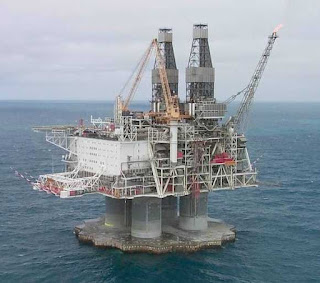In terms of environmental protection, offshore petroleum board failing us
The following letter to the editor is published in the Saturday, Feb. 9th Weekend Telegram. The above picture is of the Hibernia offshore oil platform.
HEADLINE: There are problems with the offshore regulator
DECK: And the federal government is in no rush to fix them
By Ryan Cleary, NDP MP St. John's South-Mount Pearl
The public’s confidence in the Canada-Newfoundland and Labrador Offshore Petroleum Board (CNLOPB) was already shaken following a string of political appointments, as well as the board’s failure, to date, to follow through on the chief recommendation of the Wells inquiry report into the 2009 crash of Cougar helicopter Flight 491.
But the latest news — that the board responsible for regulating the offshore oil industry isn’t prepared for a major offshore oil spill — is a shocking condemnation that may undermine what little public confidence remains.
Released this week, the latest report from Environment Commissioner Scott Vaughan points out how the CNLOPB has not yet completed an assessment of the spill response capabilities of the offshore operators (which are required to respond to spills) — almost five years after the assessment began.
Further, the report says the CNLOPB isn’t prepared to take over response to a major offshore oil spill if an operator fails to respond as required.
In a nutshell, when it comes to environmental protection, the CNLOPB is failing us.
If there were a major offshore oil spill tomorrow, the CNLOPB doesn’t know whether the offshore oil companies would have the equipment or resources to deal with it, and the board itself wouldn’t be prepared to pick up the slack.
To quote the commissioner’s report (the first such audit of the petroleum board), “The potential impact of an offshore oil spill in Atlantic Canada, such as seen in the Gulf of Mexico in 2010, could be widespread and devastating to the environment, industry and the livelihoods of many Canadians.”
Speaking of livelihoods, positions at the CNLOPB can be quite lucrative (the chair alone makes roughly $250,000 a year), but then the work is incredibly important.
Unfortunately, politics is perceived to have seeped into the selection process.
Elizabeth Matthews, director of communications to former premier Danny Williams, was initially nominated as vice-chair of the CNLOPB, although she later withdrew her name and the position was recently filled by Ed Williams, friend to the Dunderdale administration and Danny’s brother.
While the new chair of the board, Scott Tessier, worked for Chevron, he also served as chief of staff to former Conservative MP Loyola Hearn.
Then there’s the appointment of Reg Bowers, Peter Penashue’s former campaign manager, to the board of directors.
As it stands, the CNLOPB is currently considering a request by offshore oil companies to resume helicopter night flights — which have a higher risk than day flights.
The most important recommendation of the Wells inquiry into the 2009 Cougar crash was for an independent safety regulator for the offshore oil industry.
An independent safety regulator — not the CNLOPB, nor the oil companies themselves — would be the best judge of justifiable risk.
Will that recommendation see the light of day?
My gut says no — what the Conservative government wants, it usually gets, with our safety and the environment paying the ultimate price.




Comments